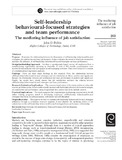| dc.contributor.author | Politis, John D. | |
| dc.date.accessioned | 2016-01-29T08:55:16Z | |
| dc.date.available | 2016-01-29T08:55:16Z | |
| dc.date.issued | 2006 | |
| dc.identifier.issn | 0143-7739 | |
| dc.identifier.uri | http://hdl.handle.net/11728/7144 | |
| dc.description.abstract | Purpose – Examines the relationship between the dimensions of self-leadership behavioural-focused strategies, job satisfaction and team performance. It also evaluates the extent to which job satisfaction mediates the influence of self-leadership behavioural-focused strategies on team performance.
Design/methodology/approach – Involves a questionnaire-based survey of employees from a manufacturing organisation operating in Australia. A total of 304 useable questionnaires were received from employees who are engaged in self-managing activities. These were subjected to a series of correlational and regression analyses.
Findings – There are three major findings in this research. First, the relationship between self-leadership behavioural-focused strategies and job satisfaction is direct, positive and significant. Second, the relationship between job satisfaction and team performance is positive and significant. Finally, the results have clearly shown that job satisfaction mediates the relation between self-leadership behavioural-focused strategies and team performance.
Research limitations/implications – The cross-sectional nature of the study renders it vulnerable to some problems so that future studies should measure self-leadership behavioural-focused strategies, job satisfaction and performance using longitudinal data and/or data from multiple sources.
Practical implications – The study suggests that organisations emphasising empowerment should utilise training programs aimed at developing employees’ self-leadership behavioural-focused strategies that focus on self assessment, self-reward and self-discipline.
Originality/value – The paper is the first to examine self-leadership behavioural-focused strategies influences through a covariance structure analysis. It also clarifies the mediating affects of job satisfaction on the self-leadership behavioural-focused strategies/team performance relationship. | en_UK |
| dc.language.iso | en | en_UK |
| dc.publisher | Emerald Group Publishing Limited | en_UK |
| dc.relation.ispartofseries | Leadership & Organization Development Journal;Vol. 27 No. 3 | |
| dc.rights | © Emerald Group Publishing Limited | en_UK |
| dc.rights.uri | http://creativecommons.org/licenses/by-nc-nd/4.0/ | en_UK |
| dc.subject | Empowerment | en_UK |
| dc.subject | Job satisfaction | en_UK |
| dc.subject | Team performance | en_UK |
| dc.subject | Self-development | en_UK |
| dc.subject | Leadership development | en_UK |
| dc.title | Self-leadership behavioural-focused strategies and team performance. The mediating influence of job satisfaction | en_UK |
| dc.type | Article | en_UK |
| dc.doi | 10.1108/01437730610657721 | en_UK |


